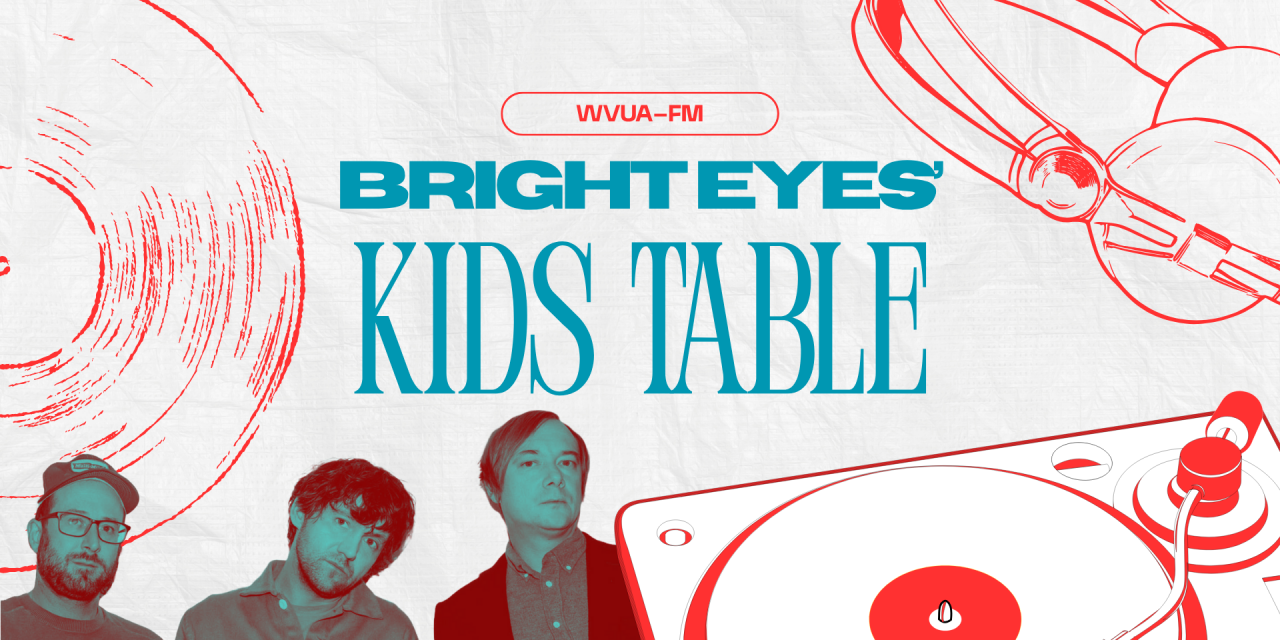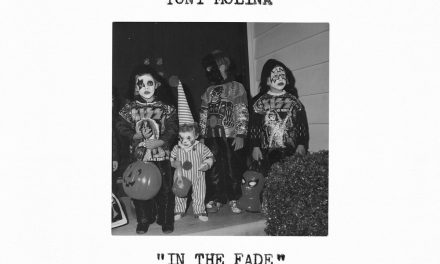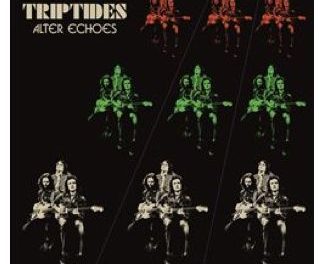Bright Eyes’ Kids Table arrives as both companion and epilogue to their previous album, Five Dice, All Threes. At just eight tracks with a short runtime, some have dismissed it as a set of leftovers. But this cohesive collection shows clear intent: songs that Conor Oberst and the Bright Eyes trio believed deserved their own stage.
The cover art hints at the tension running through the EP, swaying between despair and hope. Styled as an “Existential Activity Fun Page,” it resembles a warped Game of Life, charting milestones both mundane and absurd: prom, adopting a pet, house arrest, night terrors, anything you can think of. The opener, “Kids Table,” carries that contrast in its lyricism, pairing nostalgia with quiet betrayals and the bittersweet clarity of looking back from the margins. A sample of a child’s voice describing himself as a “problem child” begins this track, pointing to themes of naivety, innocence, and the complexities of childhood.
The record then softens. “Cairns (When Your Heart Belongs to Everyone)” is a quieter piece—pleasant but easily overlooked compared to louder moments on the EP, though for me it’s my favorite. It’s a song about empathy, about the desire to connect with others and the strain of caring too much. Its folky warmth recalls I’m Wide Awake, It’s Morning, suggesting Oberst’s longing for something simpler, more grounded. This track also ties in samples of a child’s voice, this time talking about a doll that is being taken care of, emphasizing the point that the subject of this song is doing too much to take care of others. I’m in love with how this track builds onto itself, slowly growing into a crescendo that you’re not quite expecting at the beginning, and it only hits you at the very end: “You have to mop the halls of a hospital / ‘Cause you’re the only one who cares,” is a devastating line that really pushed this song into being my favorite.
From there, Kids Table shifts into “1st World Blues,” a ska-inflected rhythm of off-beat percussion and gang vocals. The track pokes fun at consumerism and modern malaise with Oberst’s usual wit, referencing everything from Hot Topic to Reaganomics. It’s bold, a little messy, and divisive—but its energy is undeniable once it clicks.
The EP’s emotional centerpiece follows with “Sharp Cutting Wings (Song to a Poet).” Rather than reinventing Lucinda Williams, Bright Eyes deliver a weary, vulnerable rendition made even more poignant by its role in Oberst’s recovery from a vocal emergency in 2024. Choosing this as the first song to sing after regaining his voice lends it weight. Leslie Stevens’ harmonies in the final chorus a sense of add grace, binding the cover together. The short interlude “It Always Feels Good and It Never Hurts” follows—a minute of shattering dishes, humming, and sobbing—that leaves the listener reeling after such intimacy.
Juxtaposing the last two songs, “Dyslexic Palindrome” featuring Alynda Segarra emerges as the standout of the album. The vocal interplay between Oberst and Segarra is electric, their contrasting timbres pulling the track between grit and melody. Thematically, it’s about escape, pressure, and being seen in a distorted mirror—one of the most affecting pieces of the album. While “Cairns” is my absolute favorite from Kids Table, “Dyslexic Palindrome” is one of those songs that you have to love. It’s gut-wrenching, heart-pulling, and absolutely beautiful; it’s incredibly reminiscent of old Bright Eyes moments.
It’s rare for me to love every single song off a record–even my favorite albums of all time have their lows–and the next song off of Kids Table is one that I’m not a fan of. “Shakespeare In A Nutshell” is an ambitious lyric-dense song packed with references from Guy Fawkes to Mrs. Peacock to Shakespeare himself. I love metaphor stuffed songs and poetry, but the way it was done on this track just didn’t work for me. Still, I appreciate the concept: the reduction of something grand and literary into something flattened, packaged, cliché. The question of what is gained and lost when cultural weight is boiled down lingers even if the song doesn’t fully connect.
The EP closes with “Victory City,” inspired by Salman Rushdie’s novel about a state that can’t live up to its ideals. It weaves themes of ambition and fragile defiance into a powerful finale. Dwelling in the liminal space between surrender and persistence, it channels Bright Eyes’ knack for resilience in the face of fracture. This track feels the most familiar-if I were introducing someone to the band, this would be the song I’d choose.
Kids Table is more than a B-sides dump. It’s a curated extension of Bright Eyes’ current era (post-Five Dice), balancing emotional highs and creative risks. Eclectic yet intentional, experimental yet vulnerable, it shows a band still restless nearly thirty years later. It may not reach the heights of Lifted or Fevers and Mirrors, but it deepens the current era of Bright Eyes with wit and playful defiance. More than leftovers, Kids Table feels like an invitation: pull up a chair, listen closely, and rediscover a band still unwilling to sit quietly.
Cover/ Bright Eyes Press
Hi! My name is Oswin Colley and I'm a News Media major with a minor in Digital, Public, and Professional writing at the University of Alabama. I have worked in media for four years as a writer, reporter, and photographer in the central Alabama area. My favorite albums are Crying, Laughing, Waving, Smiling by Slaughter Beach, Dog and Open This Wall by Berlioz







